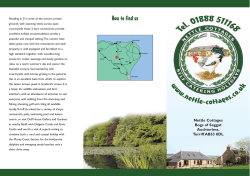
Nature vs Nurture
Nature vs Nurture October 9, 1920 The same Saturday, October 9, 1920, evening, long before dusk, at about 4:30 or 5:00 p.m., we stealthily boarded the machan and anxiously waited there for an hour or so. All of a sudden, a grown-up wolf came out from one of the holes, which was very smooth on account of their constant egress and ingress. This animal was followed by another one of the same size and kind. The second one was followed by a third, closely followed by two cubs one after the other. The holes did not permit two together. Close after the cubs came the ghost — a hideous-looking being — hand, foot, and body like a human being; but the head was a big ball of something covering the shoulders and the upper portion of the bust, leaving only a sharp contour of the face visible, and it was human. Close at its heels there came another awful creature exactly like the first, but smaller in size. Their eyes were bright and piercing, unlike human eyes. I at once came to the conclusion that these were human beings. by The Reverend J. A. L. Singh Missionary, The Orphanage, Midnapore, India. “Kamala”, 1920 "Part of being a human is being brought up by humans. If you're not brought up by humans, are you completely human?" (Professor James Law, London's City University) What do you think? Humans have probably have been around in their present form for 120,000 years. However, we only discovered language and became technologically creative as late as 40,000 years ago. So what were humans like before that? And what would we be like if the influence of our current society was not present? Feral Children Feral children are children who have spent much of their formative years in the wild, without any contact with other humans for a significant period of their lives. Cases of feral children are thankfully rare, but are of immense interest from a scientific and educational point of view. Feral children provide data which help to answer a number of questions: How close is human nature to the nature of an animal? What aspects of human nature are genetic, and what aspects are learned? What does consciousness mean? Could we learn how to speak to animals, or could we teach animals to speak to humans? Studies of feral children in the past have lead to breakthroughs in the education of people with learning disabilities, and indirectly has lead to the development of sign-language and Braille. Stories of feral children pop up every now and again in the media, but most stories are uncorroborated, and many are pure fantasy. However, there are a few cases which did occur in history which were the subject of intense scientific scrutiny. Kamala & Amala Kaspar Hauser Victor of Aveyron It has always been thought that nurture played a significant part in the development of human beings — but exactly what part? Just to what extent can we attribute the development of human abilities and achievements to what we're born with or to the environment in which we're brought up? And what can the evidence from feral children tell us? “The Noble Savage” During the European Enlightenment, JeanJacques Rousseau propounded the view that man is born pure (or, more accurately, does not do ill because of "the peacefulness of their passions, and their ignorance of vice") but is then corrupted by society — by nurture. Nature versus nurture Feral children ought to be an excellent source of evidence in the continuing nature-nurture debate. Feral children cannot walk, talk, or socialise: they cannot show empathy with others... On the surface, therefore, feral children suggest that our upbringing is entirely responsible for giving us language, the ability to think and other traits. What happens in early childhood thus has a profound impact on the neurological development of the brain. The role of nature Nature has a vital role to play too. Firstly, the brain is highly specialised — being specifically designed for many of the tasks it is called on to perform — even to the extent of having inbuilt mechanisms not just for learning language, but even for grammatical constructions. Secondly, genetic variations have a considerable affect on the intellectual abilities and other characteristics of human beings. For example, identical-twin studies show us that in some cases, autism can be triggered by nurturing — but only when nature has dealt out a particular combination of genes. Ultimately, we are the result of complex interactions between the environment and our genes. In the end… Therefore… In conclusion… Q: Experimentation can be unethical, but how could you test nature v nurture on twins? Social behaviour Quite simply, feral children are usually entirely unaware of the needs and desires and others. The concepts of morals, property and possessions are alien to them, and they can't show empathy with other people. If brought up by animals, they don't even identify themselves as human, but probably regard humans as "the enemy". (from www.feralchildren.com/en/nature.php) The Indian Wolf-Girls In a modern version of the Romulus and Remus story, two young girls wer e discovered under the care of a she-wolf in 1920, in Godamur i, India. The girls were taken to an orphanage in Midnapore (now part of Orissa). The children, Kamala, aged eight and Amala, aged 18 mo nths, behaved exact ly like small wild animal s. They slept during the day and woke by night. They remained on all-fours, enjoyed raw meat, and were given to biting and attacking other children if provoked. They could smell raw meat from a distance, and they had an acute sense of sight and hearing. The youngest child, Amala, died one year later, but Kamala lived for nine years in the orphanage until she died of illness at the age of 17. Kama la did acquire a small vocabulary, but she remained very different to other children until the time of her death. Kaspar Hauser Kaspar was discovered in 1828 in Nuremberg, Germany. He was unsteady on his feet, and only spoke the phrase 'I want to be a horsema n like my father is'. Kaspar was about 16 years old, but he behaved like a small child. It appears that for most of his early childhood, Kaspar was impr isoned in a cage, with hardly any contact with the outs ide world. When a mirror was handed to him he used to look behind him to find the person in the mirror, and could not understand how faraway objects appeared smal ler than objects close by. Kaspar had a keen sense of smell. He detested mea t and alcohol, and was offended by the s mell of flowe rs. He loved wooden horses, and he thought the sky was full o f candles. Unlike many other of the cases described here, Kaspar did learn much, but in 1833 he was assa ssinated . The mystery of his early life and violent deat h have never been satisfactorily answered. Victor, The Wild Child of Aveyron Victor, a boy of about 11 or 12, was discovered foraging for roots and acorns in the woods near Aveyron, France in 1799. Victor was ta ken to Paris, where he appeare d to be human only in appearance. Vict or behaved like an animal , ate rotten food with pleasure, was incapable of distinguishing hot from cold, and spe nt much of his time rocking back and forth like a caged animal. Victor was taken into the care of the brilli ant scientist, Dr Jean-Marc-Gaspard Itard, who dedicated hims elf to the education of the boy. Victor proved to be a very difficult subject. Over the years, Victor only learned two terms, 'lait', and 'oh Dieu'1. His sense of touch seemed t o be far more important than his sense of sight, he did not demo nstrate an ability to distinguish right from wrong, and like Peter before him, he was indifferent to sex. He did however, learn some menial tasks, such as sett ing a tab le. Victor lived the rest of his life in the care of his housekeeper, and died in 1828 at the age of 40. “When the child has adverse experiences — loss, threat, neglect, and injury — there can be disruptions of neurodevelopment that will result in neural organization that can lead to compromised functioning throughout life.” Dr Bruce D Perry, Childhood Experience and the Expression of Genetic Potential Read the “Identical Personalities” article, then answer the questions on the next slide. QUESTIONS 1. Do you think personality traits are primarily inherited or influenced by environment? What is your evidence? 2. Why do you think nature versus nurture is debated? Do you think it is possible to answer this question definitively? Why or why not? 3. Who might be most interested in resolving the nature versus nurture debate? What effect might a resolution have on our society? 4. If you were raising identical twins, what might you do to make sure that they were unique individuals? Explain your answer 5. Based on what you have learned, do you think it is possible to change your personality? Why or why not? If so, how would you go about making changes? 6. If you are not a twin, would you rather be an identical or a fraternal twin? Why? What do you think would be some of the challenges of being a twin? If you are a twin, write a couple of sentences about the experience. Is it fun? Difficult? If you have other siblings, is your relationship with your twin different from the relationship with your other siblings? If so, what makes it different?
© Copyright 2025














